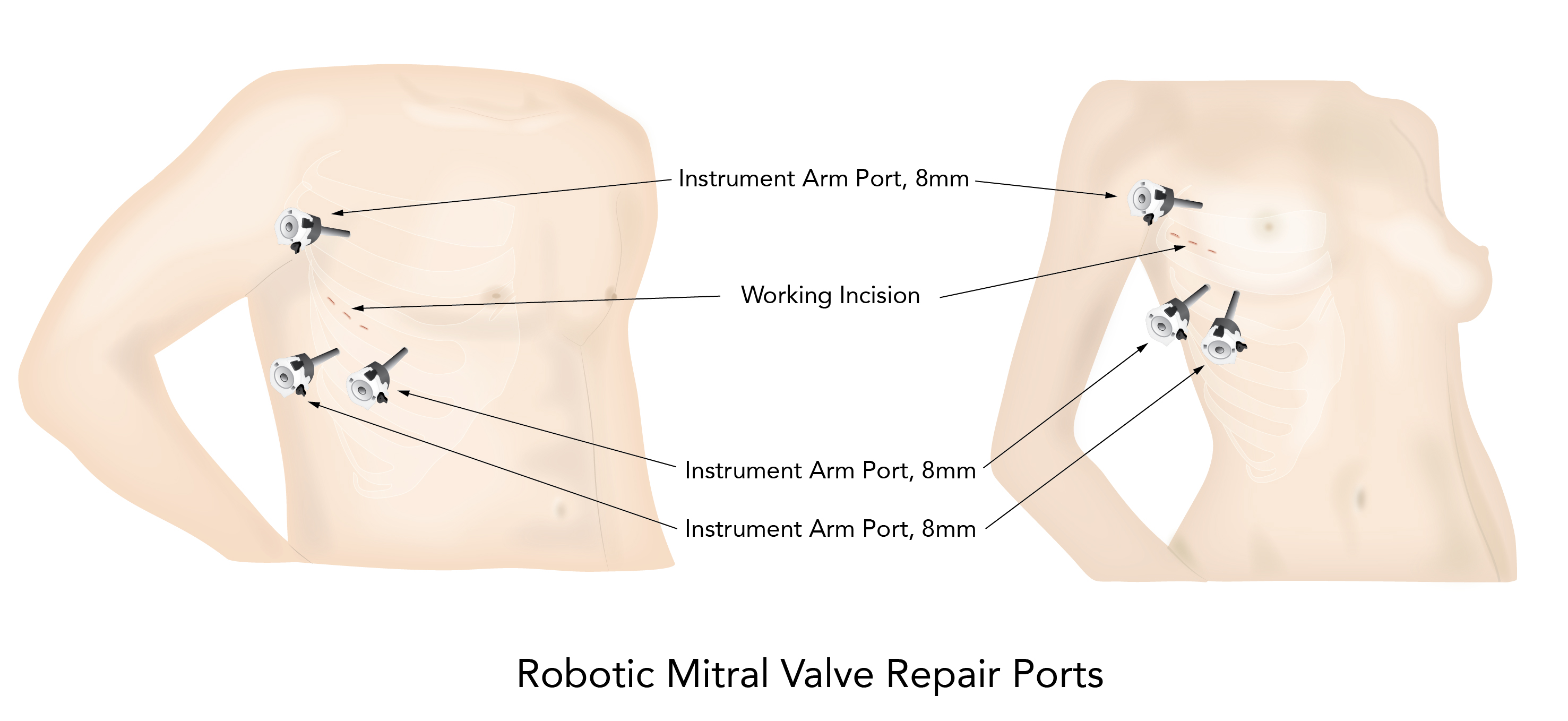Weill Cornell Medicine is at the forefront of minimally invasive heart surgery techniques, including robotic cardiac surgery.
Endoscopic robotic heart surgery
This is a type of minimally invasive surgery that uses robotic instruments and very small incisions to operate on the heart. This is an alternative to traditional, “open heart” surgery (sternotomy).
The ability to perform surgery through tiny incisions can improve both the outcome of surgery and recovery time. Smaller incisions mean less blood loss, less post-operative discomfort, a faster recovery, and a lower risk of infection. In many cases—including mitral valve repair—the success rates using robotic surgical techniques are higher than when traditional surgery is used.

Robotic heart surgery at Weill Cornell Medicine
The Weill Cornell Medicine Department of Cardiothoracic Surgery offers endoscopic robotic surgery to patients who are good candidates for these procedures.
Our surgeons use robotic techniques to perform many types of heart surgeries, including:
● Mitral valve repair or replacement (mostly repair)
● Atrial septal defect closures
● Removal of cardiac tumors (atrial myxomas for example)
● Septal Myectomy for Hypertrophic Cardiomyopathy
● Tricuspid valve repair or replacement
● Coronary artery bypass (for blocked arteries to the heart)
● Pacemaker lead placement (for heart failure)
Our patients benefit from:
● Our record of excellent outcomes
● Our surgical team works with each patient to develop an individualized, comprehensive treatment plan
● Access to world-class imaging technology for the most accurate diagnosis possible
● Collaboration with other specialists (such as cardiologists and anesthesiologists) to provide seamless, high-quality care
● The research being conducted at Weill Cornell Medicine that is pioneering minimally invasive and robotic surgical techniques

We recommend visiting the Weill Cornell Medicine Cardiothoracic Department website, as well as the American Heart Association.
Once you and your care team decide that surgery is the best treatment plan for your condition, you will schedule a pre-surgical appointment, which takes place at M404.
During your pre-surgical appointment:
Your nurse practitioner will explain what you can expect for your specific surgery and hospital stay
Your nurse practitioner will review your current medications
You will sign a consent form for the surgery and potential blood transfusion (Please note: Most patients do not receive blood transfusions during surgery, but we are required to have you sign this consent form, just in case you do need a transfusion and are not awake at the time to give your consent. ALL blood is stringently tested for HIV, hepatitis, and cytomegalovirus.)
You have the opportunity to ask questions
You will receive a small bottle of antibacterial soap
This process generally takes two to three hours.
You will be given instructions as to which medications you should stop taking to prepare for surgery.
On the night before your surgery, shower using half of the bottle of antibacterial soap. On the morning of the surgery, before you come to the hospital, shower using the rest of the soap.
Do not eat or drink after midnight the night before your surgery. You may take your medications that the nurse practitioner approved you to take the morning of surgery, with just a small sip of water.
Parking is available in front of the 68th Street circular entrance to the hospital. There are also several parking garages in the immediate area.
Parking is only validated on the day of your hospital discharge, not on the day of your pre-surgical appointment.
Please be sure to bring you:
Insurance card(s)
Toiletries
Pajamas, robe, and slippers
Generally try not to bring too much to the hospital, because you probably won't use a lot of these things and will just have to carry them home.
Please do not bring any jewelry or expensive electronics with you for the first hospital day. Your family and friends are welcome to bring those items once you are awake and in your room.
Please check in at Greenberg 3-West (Same-Day Surgery Unit), which is on the third floor of the Greenberg Pavilion, using the "G" elevators.
If you are the first case, please check in at 6 AM. If you are the second case, please check in at 10 AM.
The usual length of the actual cardiac surgery is about three and a half to four hours. However, the total length of time your family member will spend in the operating room is longer. Much of that "extra time" is spent preparing you for surgery and getting you ready to go to the recovery room (PACU) or ICU following surgery.
During your surgery, your family and friends should wait in the Ronald O. Perelman Heart Institute Atrium. Please tell them to check in at the front desk so that they can be contacted when your surgeon calls.
If the Ronald O. Perelman Heart Institute Atrium is closed at the time of your surgery, your family and friends may wait in the smaller waiting area right outside the Cardiothoracic ICU (4-West).
There is also a café on the first floor of the hospital, directly opposite the information desk and down the hall from the front door on the left, which is open at all times. This café sells coffee, tea, and a variety of food.
Please download our extensive Guide to Surgery.
Please see Insurance Questionsor call (212) 746-5161.

